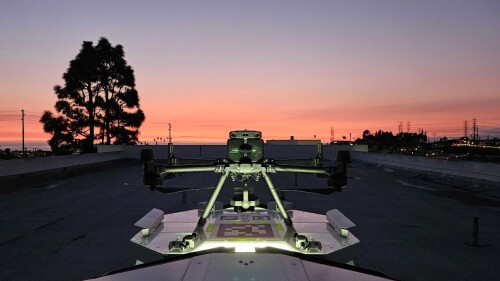cleveland.com
CLEVELAND — Today, firefighters and paramedics race to the scene when someone dials 911. But in the not-so-distant future, Cleveland’s first responders may be deployed alongside — or even after — drones fly to the scene.
Cleveland is exploring the idea, and city officials are asking technology firms to pitch proposals for a “Drone as First Responder” program
In the RFQ, Cleveland suggests that drones could respond on-scene within minutes of dispatchers receiving a 911 call. That live video would give supervisors a better understanding of the situation before any people or equipment arrive on scene.
City spokesperson Jamil Hairston said Cleveland is in the information-gathering stage, and said this RFQ is just to investigate and see what is possible.
Cleveland’s RFQ does not include sending drones to respond to 911 calls to the police. The Division of Police bought in early 2024, but currently does not deploy them to emergency calls. The Community Police Commission has final say over police policy and dictates when and how officers can use drones.
According to the RFQ, drones could allow dispatchers and public safety officials to see how severe a scene is, which may help them decide how many people or what equipment to send. Recordings of incidents and the 911 response could also be used after the fact for reviews or training.
Cleveland also says the drones would help keep firefighters, paramedics and EMTs safe, saying that increased visibility “can mean the difference between life and death.”
“Dispatchers and First Responders equipped with drone technology rapidly make informed decisions from a safe distance, which ultimately may reduce injuries and save lives,” the city said in its RFQ.
According to the RFQ, Cleveland is looking for drones capable of flying 53 mph. They’d also be equipped with thermal imaging and zoom cameras, and able to operate in a wide range of weather conditions. Video would be streamed in real time through a citywide surveillance platform, and a public dashboard would be created so that community members could see flight logs and redacted flight data.
Councilman Mike Polensek, who chairs council’s public safety committee, said city officials have yet to pitch the new drone idea to city council. But he said he supports Cleveland using drones for fire and EMS calls, as well as for police and for non-emergency uses — like building inspections.
Polensek said other cities are already using drones. Some will have a drone at each fire station, and those drones will fly to a scene before firefighters arrive.
Other cities use drones to follow suspects fleeing a scene, cutting down on high-speed police chases, Polensek said. Or they use them so that building and housing departments can see inside of closed off junkyards for inspections.
He said Cleveland is “in the stone age compared to other cities.” Council approved legislation years ago to buy drones for police, but Polensek said those drones have seldom been used.
Polensek and others on council have asked the civilian-led Community Police Commission to change their policy so that Cleveland officers can more readily use drones.
The Community Police Commission’s police largely airs on the side of privacy, and for instance, doesn’t allow officers to use drones to surveil large crowds during protests.
It’s unclear how sending drones to help fire and EMS responders may conflict with police drone policy, since EMS, fire and police may all respond to the same 911 call. The Community Police Commission has no authority over fire or EMS policy.
If Cleveland moved forward with its plan to use drones on fire and EMS calls, the Community Police Commission would have to see how the police department is involved, if at all, said Piet van Lier, who leads the civilian-led commission’s policy committee.
©2025 Advance Local Media LLC.
Visit .
Distributed by















